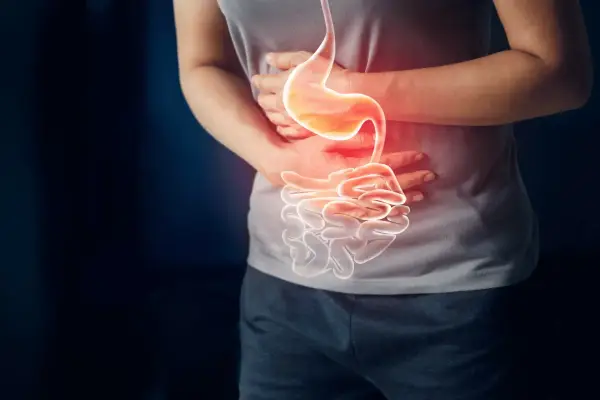![Healthy Matters]() Pharmacist Tips | Dosages | Side effects
Pharmacist Tips | Dosages | Side effects![Healthy Matters]() Nutritionist Tips | Facts | Precautions
Nutritionist Tips | Facts | Precautions![Healthy Matters]() Practitioner Tips | Dosages | Side effects
Practitioner Tips | Dosages | Side effects![Healthy Matters]()
![Healthy Matters]()

Peptic ulcer: Ulcers in the digestive tract
5 min read

Peptic ulcers are open sores that develop in the lining of the esophagus, stomach, and upper portions of the small intestine (duodenum). A peptic ulcer is commonly caused by a bacterial infection. One in three Hongkongers was estimated to be infected with the bacteria that could lead to peptic ulcers. Read to learn more about the symptoms and causes of peptic ulcer disease.
Peptic ulcer meaning: What is it?
Peptic ulcers are open sores that develop in the lining of the digestive tract. The mucus lining that coats the digestive tract is responsible for protecting against acid. The word “peptic” means the cause of the problem is due to acid. When there is an imbalance between stomach acid production and mucus production by the lining of the digestive tract, it can lead to the formation of a painful open sore, resulting in a peptic ulcer.
Peptic ulcers are named according to the locations of their occurrence: esophageal ulcers develop in the lower part of the esophagus, gastric ulcers develop in the stomach and duodenal ulcers develop in the upper portions of the small intestine (duodenum).
Peptic ulcer symptoms and signs
Peptic ulcer may or may not have any symptoms depending on the severity of the patient’s condition. Some common symptoms include
- Abdominal pain - a gnawing pain that can be felt anywhere from the middle of the tummy up to the neck, down to the belly, or even through the back
- Burning sensation in the upper stomach, usually worse when hungry for duodenal ulcers; and worse after eating for gastric ulcers
- Abdominal bloating
- Loss of appetite
- Nausea and vomiting
- Weight loss
You should seek urgent medical advice if you experience a sudden and worsening sharp abdominal pain, vomiting blood or passing dark and tar-like stools. As these could be a sign of serious complications, such as bleeding from peptic ulcers.
Peptic ulcer causes
Peptic ulcers to occur when the protective mucus lining breaks down, which allows the stomach acid to damage the mucus lining. The common causes include:
- An infection with Helicobacter pylori (H. pylori) bacteria - the bacteria may be passed from person to person through direct contact with saliva, vomit, or fecal contamination of food or water
- Use of non-steroidal anti-inflammatory drugs (NSAID) such as ibuprofen or aspirin
- Rare medical condition - Zollinger-Ellison Syndrome is a rare condition in which the tumor causes the stomach to produce too much acid, resulting in peptic ulcers
- Extreme stress
Peptic ulcer risk factors
Peptic ulcers are more likely to present in those with the following risk factors:
- Smoking - smoking can also slow down the healing of existing ulcers and contributes to recurrence of ulcer
- Excessive alcohol consumption
- Stress
Peptic ulcer diagnosis
Peptic ulcer may be suspected based on the symptoms and other associated risk factors. If doctors suspect the symptoms are caused by an H. pylori infection, they may recommend the following tests:
- Stool sample
- Blood test
- Urea breath test - During the test you will be asked to swallow a test pill, then blow into a balloon-like bag. H. pylori bacteria turn urea into carbon dioxide. If you have the bacteria, this test will show an increase in carbon dioxide
- Upper gastrointestinal endoscopy - The stomach and digestive system doctors (gastroenterologist) will insert an endoscope (long thin tube with a camera) from your mouth through your digestive tract into your stomach, which allows visualization of the stomach lining. You may also have a tissue sample (biopsy) taken from the stomach lining to test for H. pylori infection
Peptic ulcer treatment
Treatment of peptic ulcers depends on the underlying cause of the ulcers.
If H. pylori infection was confirmed, doctors will usually prescribe a two-week-course of eradication therapy with
- Antibiotics - two or three antibiotics such as amoxicillin, clarithromycin, and metronidazole are commonly used to eradicate H. pylori bacteria. You will be retested at least 4 weeks after completing the antibiotic course to check if there are any H. pylori bacteria left in the stomach. It was shown that this eradication therapy was beneficial in both healing and preventing the recurrence of ulcers
- And proton pump inhibitors (PPIs) - PPIs can directly suppress stomach acid production by blocking the cell that is responsible for acid secretion, thereby promoting ulcer healing.
If the peptic ulcers disease is caused by the use of NSAIDs, the NSAIDs should be withdrawn if possible and added in a one-to two-month course of
- Proton pump inhibitors (PPIs)
- Or Histamine-2 receptor antagonists - works by suppressing the secretion of stomach acid by blocking the action of a protein (histamine) that stimulate stomach acid secretion (such as ranitidine and famotidine)
If the peptic ulcer is caused by a combination of using NSAIDs and H.pylori infection, doctors will usually prescribe:
- Two-month-course of Proton pump inhibitors (PPIs)
- And a course of eradication therapy with antibiotics
It is important to Inform your doctor your medical history and other drugs that you are taking as some medications may interact with peptic ulcer medications, and some medical conditions warrant special precautionary measures.
Peptic ulcer complication
Complications of peptic ulcers are relatively uncommon, but they can be very serious if left untreated. Which includes:
- Internal bleeding - can occur when the ulcer develops at the site of a blood vessel, leading to long-term or rapid severe bleeding, which results in anemia or the patient vomiting blood or passing black and tar-like stool. You should seek urgent medical advice if you experience these symptoms.
- Peptic ulcer perforation - peptic ulcers can perforate through the wall of the stomach or small intestine, exposing the abdominal cavity to risk of developing serious infection (peritonitis)
- Gastric outlet obstruction - an inflamed or scarred peptic ulcers can block the passage of food through the digestive system, causing you to become full easily, to vomit large amounts of undigested food and to lose weight unintentionally
Preventions of Peptic ulcer
You can reduce your risk of developing peptic ulcer by:
- Stop smoking and reduce alcohol consumption - healthy lifestyle and diet can accelerate ulcer healing and prevent recurrence of peptic ulcer
- Cautious with pain relievers - consult your doctor about alternative to NSAIDs if you use pain relievers regularly, or discuss protective measures such as an antacid or a PPI if you cannot stop taking NSAIDs
- Protect yourself from infections - H. pylori is thought to be passed from person to person through direct contact with saliva, vomit or fecal contamination of food or water
FAQs
Peptic ulcers occur when the protective mucus lining breaks down, which allows the stomach acid to damage the mucus lining. The predominant causes of peptic ulcer disease are infection with Helicobacter pylori and the long-term use of non-steroidal anti-inflammatory drugs such as ibuprofen and aspirin.
A peptic ulcer is curable. Management options will be different depending on the cause of the peptic ulcer. Antibiotics can cure most peptic ulcers caused by Helicobacter pylori infection. Usually, a test will be repeated at least 4 weeks after completing the antibiotic course to ensure the bacteria has been eradicated. Other medications including proton pump inhibitors (PPI) or Histamine-2 receptor antagonists are also used in NSAIDs-induced peptic ulcers.
Peptic ulcers may recur if the underlying cause is not eliminated or treated. Therefore it is important to seek medical advice and avoid leaving the underlying cause untreated. If left untreated, peptic ulcers can lead to serious complications such as internal bleeding, perforation of the ulcer, and gastric outlet obstruction.
This article was independently written by Healthy Matters and is not sponsored. It is informative only and not intended to be a substitute for professional medical advice, diagnosis or treatment. It should not be relied upon for specific medical advice.

Your health resource, made in Hong Kong
Healthy Matters is Hong Kong’s leading health resource. Our mission is to help you make better health decisions and take control of your health.
Our team of experts is committed to producing reliable health content that is accurate, engaging and relevant, to cover your health & wellness journey from prevention to treatment.
Whether you are looking for trusted information on health conditions, wellbeing or looking for the right doctor or service in Hong Kong, we’re here to help!
Your health matters. Begin your health journey with Healthy Matters today!
































